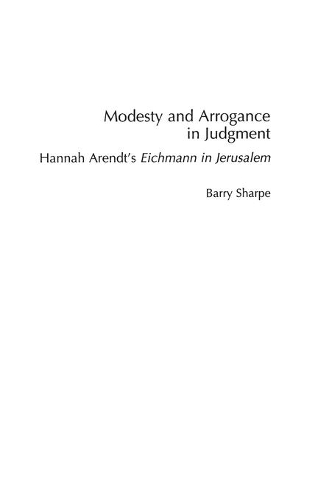
Modesty and Arrogance in Judgment: Hannah Arendt's Eichmann in Jerusalem
(Hardback)
Publishing Details
Modesty and Arrogance in Judgment: Hannah Arendt's Eichmann in Jerusalem
By (Author) Barry Sharpe
Bloomsbury Publishing PLC
Praeger Publishers Inc
30th May 1999
United States
Classifications
Tertiary Education
Non Fiction
Philosophy: epistemology and theory of knowledge
Social groups: religious groups and communities
121
Physical Properties
Hardback
192
Width 156mm, Height 235mm
482g
Description
Sharpe examines Hannah Arendt's Eichmann in Jerusalem as a case study of Arendt's theoretical work on judgment. In addition, he seeks to illustrate two dimensions of judgment: modestywho am I to judge and arrogancehow dare you judge me He demonstrates the extent to which modesty and arrogance are linked with distance. The claims who am I to judge and how dare you judge me become questions of how much distancein time, space, and imaginationis necessary or appropriate for judgment. Sharpe sees Eichmann as an unintentionally ironic demonstration of this feature of human interaction. Through his careful examination of Arendt's portrait of Adolf Eichmann and the Jewish Central Councils as well as by considering Eichmann in the context of Arendt's other work, Sharpe gives us a book that will be of great interest to scholars, students, and other researchers involved with contemporary political theory and Holocaust Studies.
Reviews
"Readers unfamiliar with Arendt will find in this commentary an admirable and useful introduction to the powerful argument she makes in "Eichmann in Jerusalem" and to the controversy still surrounding the argument...[Sharpe] updates and clarifies some of Arendt's ideas in view of more recent scholarship on the Nazis and the Holocaust. He has some very interesting and important things to say about the role and responsibility of the Judenrate."-American Political Science Review
Readers unfamiliar with Arendt will find in this commentary an admirable and useful introduction to the powerful argument she makes in "Eichmann in Jerusalem" and to the controversy still surrounding the argument...[Sharpe] updates and clarifies some of Arendt's ideas in view of more recent scholarship on the Nazis and the Holocaust. He has some very interesting and important things to say about the role and responsibility of the Judenrate.-American Political Science Review
Sharpe's book offers a subtle reading of the various modes of judgment and their accompanying feeling-tone.-Studies in Contemporary Jewry
"Sharpe's book offers a subtle reading of the various modes of judgment and their accompanying feeling-tone."-Studies in Contemporary Jewry
Author Bio
BARRY SHARPE is Assistant Professor of History and Political Science at Northwestern College. Professor Sharpe, who concentrates on Tocqueville and Arendt, has taught at Georgia Southern University as well.
